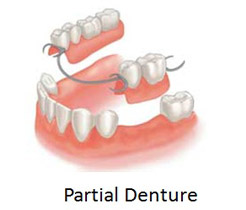
Removable Partial Dentures
A Removable Partial Denture fills in the space created by missing teeth and fills out your smile. It also helps you to properly chew food, which is a difficult task when you are missing teeth.
Removable Partial Dentures consist of a metal framework with plastic teeth and gum areas. The framework includes metal clasps or other attachments such as precision attachments that hold the denture in place. A new, comfortable, flexible and extremely aesthetic type of Removable Partial Denture called Valplast is now available.
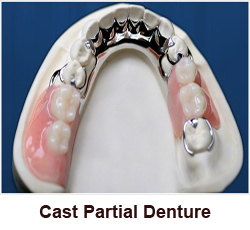
Cast Partial Dentures
An important step in maintaining a healthy smile is to replace missing teeth. When teeth are missing, the remaining ones can change position, drifting into the surrounding space. Teeth that are out of position can damage tissues in the mouth.
In addition, it may be difficult to clean thoroughly between crooked teeth. As a result, you run the risk of tooth decay and periodontal (gum) disease, which can lead to the loss of additional teeth. In situations where only some teeth are missing we can also use a Removable Partial Denture.
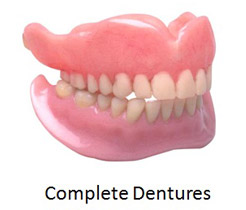
Removable Complete Dentures
A complete denture is made when the patient is missing all of his/her upper and/or lower teeth. A complete denture can enhance the look of a patient's smile and restore chewing function to a certain level. Dentures require both regular home and professional maintenance. It is important to let the dentist check not only the integrity of the denture but also the underlying soft tissue to prevent any irritation, trauma, infection or pathology.
Implant Supported Denture
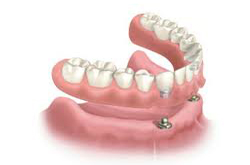
Sometimes a partial/complete denture can be hard to use due to its lack of retention and stability. Problems with lower dentures are far more common than upper dentures. Dental implants can be used to improve a denture's retention and stability, increase its functional ability, and promote patient's comfort and confidence.
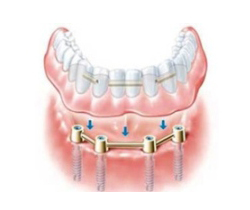
At Krishna Dental Care, we provide both traditional implants and mini implants. While traditional implants provide higher strength and restoration potential, mini implants are less invasive, have a shorter healing time and are significantly cheaper. Please consult with our dentists if you should have any questions regarding a removable denture and/ or implants.
Advantages
- Long term experience over the years.
- Relative low cost.
- Predictable results.
- Tolerated well by most people.
- Restores missing teeth and lost ridge or gums.
- Function and appearance is restored.
- Aesthetically good where lip and cheek support is inadequate.
- Can be fabricated fairly quickly.
Disadvantages
- Long term experience over the years.
- Cause pressure that results in underlying bone resorption and soreness.
- Removability- not fixed like natural teeth.
- Bulk.
- Instability because it is removable and underlying progressive bone resorption.
- Looseness as it can only sit atop the gums- especially lowers.
- Only low chewing or biting forces can be produced.
- Speech problems due to a large appliance in your mouth and it may move.
- Taste problems.
- Longevity- the need to reline to fit or wearing out.
- Covering the roof of the mouth which can result in gagging problems.
- Risk of breakage.
-
Instructions For Patients With Dentures
You've just received your new dentures. Whether you're a seasoned veteran or a new denture wearer, we're sure there are many questions which may need to be answered. We hope that the following information will prove to be helpful during the next few weeks of your denture adjustment period.
- Learning to wear a new denture can take time. Don't become discouraged if you find some difficulty in the beginning. YOU'RE NOT ALONE! Please do not listen to friends who tell you how easy it was for them to get used to their dentures and how they can eat everything and anything. They are either bragging, have greater bone and gum support or their memories may be poor. Your dentist will help you through any difficulties you may face or any situations that may arise during your adjustment period.
- A lower denture usually takes more time to adjust to than an upper denture. The tongue may feel restricted and will tend to play, sometimes even subconsciously, with the new prosthesis. It will soon adapt to the restrictions and to the new feeling that a denture presents.
- It is natural to experience fullness of the mouth with new dentures. Expect to have excessive flow of saliva. At first you will have a feeling of looseness, especially the lower denture. You will adjust to it.
- Try to eat only soft foods for the first couple of days. Then, as you progress to more solid foods try to eat slowly and deliberately, attempting to place even amounts of food on both sides at the same time during the chewing cycle. By placing food on both sides of the mouth at the same time, you balance the biting forces on the new denture and will help to make it more stable. The longer you take to eat your meal, the faster you will learn to master your new prosthesis.
- Try to take small bites at first. Cut all your food into small portions. If, and when, your gum tissues are strong enough to try foods which are bitten off (bread, corn on the cob, etc.), try to press the food against the back teeth on the upper in order to stabilize the denture.
- It is perfectly normal to experience some discomfort associated with sore spots during the adjustment period. Nature did not intend for us to wear hard plastic against soft gum tissue. It takes a while for the gum tissues to firm up and to accommodate to the hard plastic denture.
- If sore spots should develop (and in some cases they do not), please be sure to wear the denture for at least 24 hours prior to your adjustment visit! If your dentist can't see the sore spot visually, it is sometimes impossible for him to make the necessary adjustments.
- Reading aloud during the first couple of days will go a long way in reducing any minor speech problems which may result from wearing a new denture. If speech problems continue to persist, please let your dentist know.
- An unclean denture is neither healthy, attractive or comfortable. Clean you new denture every morning and night with either a denture toothbrush and denture toothpaste ( if necessary, any toothpaste can be used ) or with one of the commercially available denture cleaners or soak them overnight in baking soda and water. Please be sure to check with your dentist to make sure that the commercial cleaner will not interfere with the type of denture liner you may have in your prosthesis. Permanent soft liners and temporary soft liners react poorly to most commercial cleaners.
- We prefer that you leave out both of your dentures at night. This allows your gum tissues to breathe and also relieves them of the constant pressures of mastication. When left out of the mouth, all dentures should be left in water to prevent warpage.
- Using excessive amounts of denture adhesive to retain ill-fitting dentures invites serious problems and more involved correction at a later date.
- Gum tissues are in a constant state of change but dentures are not. Therefore, periodic relining of your dentures may be necessary. If you find your denture getting looser and mastication more difficult, this may be a sign that a reline may be needed. It is very important for your dentist to see you regularly to evaluate the state of your oral tissues and to determine if additional treatment is required. Dentures typically need to be relined or remade every 3-5 years.
- NEVER try to adjust your dentures yourself. Home remedies, although simple, will only lead to trouble.
- If any problems arise or if you have any additional questions, your dentist is available to help.
